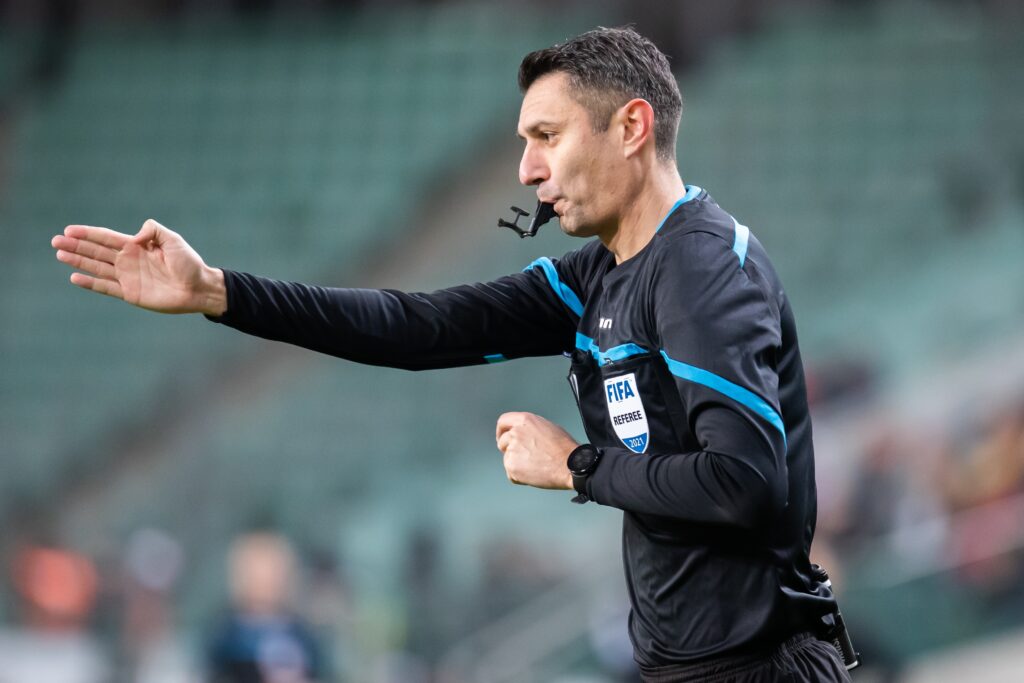Some referees are prepared to make big decisions on Key Match Incidents (KMIs) in the closing seconds of a game while other officials pray they don’t happen as time ticks down.
Which referee are you or do your officials fall into?
Some referees are overwhelmed by performance anxiety and have great difficulty bringing games to a successful conclusion or making last minute decisions.
Your mind becomes cluttered with ‘what ifs’.
“What if I’m wrong? What if I’m the reason a team loses the game? What if players and club officials are angry with me for making an incorrect decision?”
You become so anxious and tight, which leads to poor decision making and a lack of freedom.
Instead of trying to get open, you blend in the background. You basically opt out of the game hoping your colleague will make decisions for you.
You may feel that there is nothing you can do about having the confidence to close out games or how to bring games to a successful conclusion under pressure situations.
That is where psychology comes into play.
You can improve your mental game about closing out games by applying proven mental strategies.
You can definitely be the official to make the Key Match Decision or make the dynamic movement with training just like Kris Jenkins, formerly of the Villanova Wildcats, in the United States Basketball Big East Conference of NCAA Division I.
Jenkins hit a three-pointer buzzer-beater to give the Wildcats a 77-74 victory over North Carolina for the NCAA tournament championship.
“You know, we put a lot of work in. This team, everybody has the confidence to catch and shoot. So when Arch (former Villanova guard Ryan Arcidiacono) threw me the ball, one, two step, shoot ’em up, sleep in the streets. I think every shot is going in, so that one was no different.” – Kris Jenkins, former Villanova Wildcats player
How do you get the confidence of Jenkins to perform well in the closing moments of a game?
Practice specificity is a concept I work with my clients on, this helps them rehearse specific game situations in training.
When you prepare under game-like situations, you build confidence in those situations. So when you are out in the middle, you are doing what you have practiced often.
This type of preparation doesn’t eliminate anxiety, nor does it guarantee that you will make every Key Match Decisions at the end of games correctly.
Specificity practice increases confidence which helps you perform in anticipated situations.
Former Villanova head basketball coach, Jay Wright, knows the value of being mentally prepared in critical situations. He credits mental preparedness for his team’s ability to produce in the clutch.
“We do practice that. We have certain plays with less than four seconds, from four to seven seconds. Every coach has this. Zero to four, four to seven, seven to 12. We have plays. So we know what it is. We practice it every day. I didn’t have to say anything in the huddle. We have a name for it, that’s what we’re going to do. Just put everybody in their spots.” – Jay Wright, Former Villanova Head Basketball Coach
If you anticipate and prepare mentally for different game scenarios, you will have a feeling of “deja vu” instead of being overwhelmed by the unexpected.
Good mental preparation is all about being prepared to cope with any situation you will face out in the middle.
Top Strategy For Developing a Squeaky Bum Time Mentality
Write out a script for how you like to bring games to a successful conclusion, including having the confidence to be ready to make decisions and the excitement of blowing the final whistle. Rehearse how you want to perform as time runs out and the feeling afterwards.
Take this script and consider it as you train. Make it a part of your routine. You will soon see your confidence and focus improve, as well as your mental approach to making the “BIG” decision.
At The Third Team I work individually and in collaboration with different professionals where I have developed workshops and 1-2-1 sessions associated with Resilience and Mental Toughness Development to help referees. The workshops and 1-2-1 sessions are interactive, where referees are encouraged to open up and share their experiences to help themselves and each other.
Feel free to contact me if you’d like to know more about my workshops or 1-2-1 sessions and how I could help you or your officials.
Best Wishes,

Nathan Sherratt
Referee Educator & Managing Director of The Third Team

Nathan Sherratt
Nathan Sherratt, Referee Educator, Resilience Trainer and Managing Director of The Third Team. A Mental Toughness Practitioner based in Tyne & Wear, North East England.

